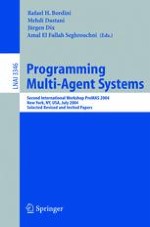2005 | Buch
Programming Multi-Agent Systems
Second International Workshop ProMAS 2004, New York, NY, USA, July 20, 2004, Selected Revised and Invited Papers
herausgegeben von: Rafael H. Bordini, Mehdi Dastani, Jürgen Dix, Amal El Fallah Seghrouchni
Verlag: Springer Berlin Heidelberg
Buchreihe : Lecture Notes in Computer Science
